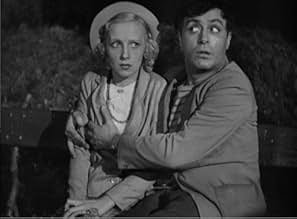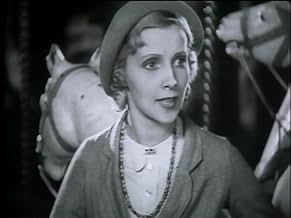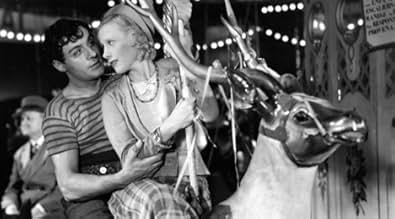Adicionar um enredo no seu idiomaTwo women love the same man in a world of few prospects. In Budapest, Liliom is a "public figure," a rascal who's a carousel barker, loved by the experienced merry-go-round owner and by a yo... Ler tudoTwo women love the same man in a world of few prospects. In Budapest, Liliom is a "public figure," a rascal who's a carousel barker, loved by the experienced merry-go-round owner and by a young, innocent maid. The maid, Julie, loses her job after going out with Liliom; he's fired... Ler tudoTwo women love the same man in a world of few prospects. In Budapest, Liliom is a "public figure," a rascal who's a carousel barker, loved by the experienced merry-go-round owner and by a young, innocent maid. The maid, Julie, loses her job after going out with Liliom; he's fired by his jealous employer for going out with Julie. The two lovers move in with Julie's aun... Ler tudo
- Direção
- Roteiristas
- Artistas
- Marie
- (as Mimi Funès)
- Alfred
- (as Alcover)
- La cliente du manège - Hippo Palace Customer
- (não creditado)
Avaliações em destaque
You can see why the confusion arises. Liliom is very much a product of its time and place. Made in France in the early 30s, it has the same blend of down-to-earth realism and dreamy sentimentality that characterises the early films of Rene Clair or Jean Vigo's L'Atalante. And this is surely why many commentators on Lang, most famous for his paranoiac thrillers, find it so hard to accept as part of the director's canon. But Lang, while he may have inflexible in style, was by no means limited in genre.
What connects all of Lang's pictures is the extravagant oddity with which they are shot. Metropolis is a baroque sci-fi, Scarlet Street is a baroque film noir, and Liliom is a baroque romance. The picture has the same intense and often musical rhythm of Lang's late silent pictures. As usual, he places us somewhat forcefully within the action at key moments, such as the opening scene where the two lovers meet, where the camera accompanies them on the carousel. We are made to feel Julie's strife through numerous point-of-view shots of Charles Boyer, or ones of a plaintive Madeleine Ozeray looking straight into the lens. The heaven and hell sequences are pure Lang fantastical indulgence, a far cry from the minimalist equivalents in the musical adaptation Carousel.
But to the consternation of the auteurists, who would maybe have Lang turn Molnar's classic into a grim fable of doom and destiny, Lang makes it abundantly clear that he can "do" romance, and do it with sincerity. In fact, viewing the director's work as a whole this is not entirely surprising – Spione, You and Me, The Big Heat and many more are incredibly tender at times. Here he gives weight to the relationship between Liliom and Julie from the way he shoots its beginning. We see Charles Boyer doing his exuberant barking act, always in mid-shot, often partly obscured by foreground business. When he lays eyes upon Ozeray, he suddenly comes into close-up. We thus connect with the character at the same time he connects with his beloved-to-be. Their first moments together are shot with typical Lang quirkiness – low angles and rapid edits. However, as the romance blossoms their moments together are allowed to play out in long takes and single camera set-ups.
Which brings me onto my next point. There is one way in which Liliom differs markedly from the average Fritz Lang picture. Normally the actors under Lang's jurisdiction were excessively hammy, all wild gestures and crazy faces, even in the lead roles. In Liliom however the keynote is one of restraint and credibility. We have a young Charles Boyer displaying all the charismatic charm that would propel him to Hollywood stardom a few years later. Sure, he is highly expressive, but in a way that is believable for that character. Madeleine Ozeray makes an incredibly fragile figure, playing out her emotions through tiny, soft movements. It's a pity she didn't share Boyer's later success. There's also a wonderfully mannered performance from Henri Richard as the commissioner. Commanding acting such as that on display here is surely the most important asset any picture can have. Regardless of how it fits into the general scheme of his work, Lang was right about Liliom. It is one of his best.
Charles Boyer, soon to take up permanent residence in Hollywood and Madeline Ozeray are perfectly cast Liliom and Julie. The character of Liliom seems perfect for Fritz Lang's dismal view of the world. Liliom would like to do better for himself, but he seems condemned to barking for a carousel ride and providing the female owner a lift now and then. Seeing Julie who is not quite as innocent as she is in Carousel is him reaching for a last chance at happiness.
One hopes there is a heaven where one might get a chance to do something that might merit decent digs there. I did like the surreal black and white images of traveling to and arriving in heaven that Lang employed.
Joseph Schildkraut did an acclaimed Liliom on Broadway and there is an earlier American talkie version of Liliom starring Charles Farrell. Drop songs in if you must, but this Liliom is a classic unto itself.
Lang is very creative in this film, keeping us offbase as to where the film is going and capturing nice shots with reflections and shadows. At one point Boyer is mired in bureaucracy waiting for a form to be stamped, which is a comical moment. I had the film scored a little higher, but it dropped a little for me in just how light it got as it played out. The film was set up for much more interesting moments, and it seemed like a blown opportunity when it got silly. I was also not a fan of one of the film's messages, that out of love in a relationship "someone can beat you, and beat you, without hurting you at all." Watch this one for the unique role Boyer plays (apparently one of the actor's favorites), and to see Fritz Lang's only French film, made shortly after he left Germany.
Você sabia?
- CuriosidadesFritz Lang considered this his best film.
- Citações
First Angel: It would be too convenient if death were the end of everything.
- Cenas durante ou pós-créditosMadeleine Ozeray, who plays Julie, also plays her daughter, but this has never been mentioned in any credit list for the film.
- Versões alternativasThe original video release of this (on Sinister Video) in 1998 did not have subtitles, and was cut by half-an-hour. The current DVD and VHS release on Kino has subtitles and is the full-length version of the film.
- ConexõesFeatured in Rodgers & Hammerstein: The Sound of Movies (1996)
Principais escolhas
- How long is Liliom?Fornecido pela Alexa
Detalhes
- Tempo de duração
- 1 h 58 min(118 min)
- Cor
- Mixagem de som
- Proporção
- 1.37 : 1






























